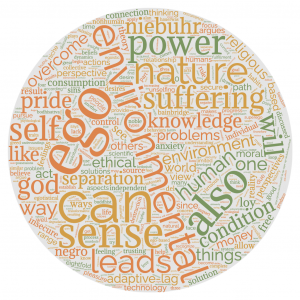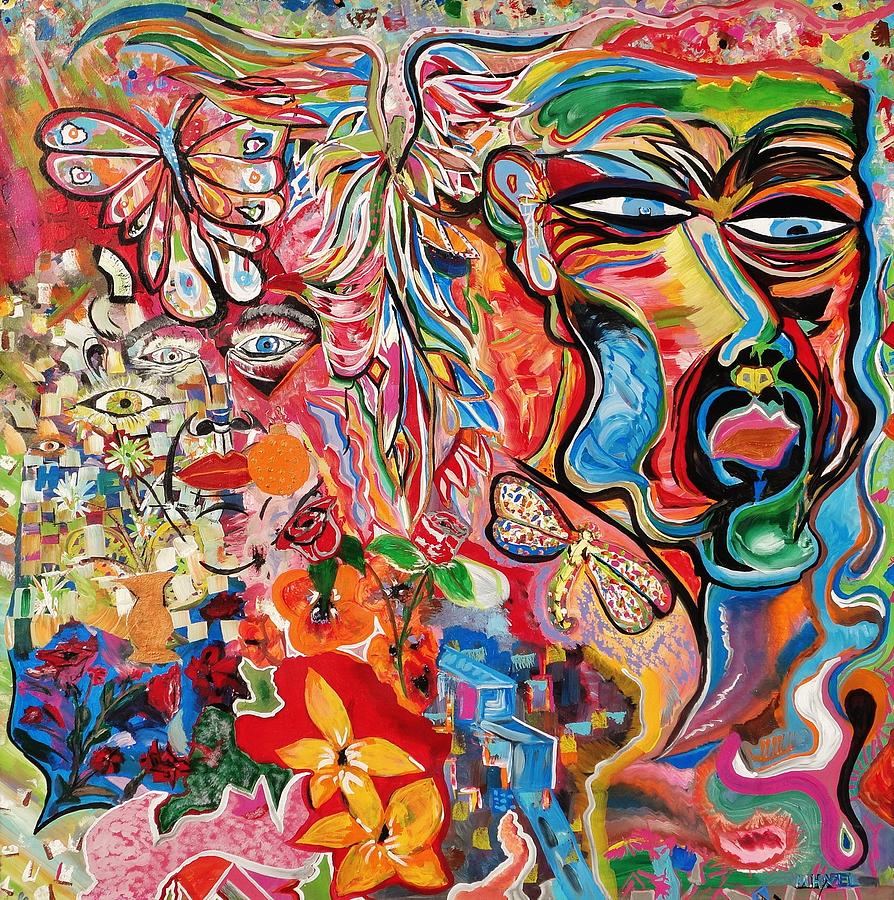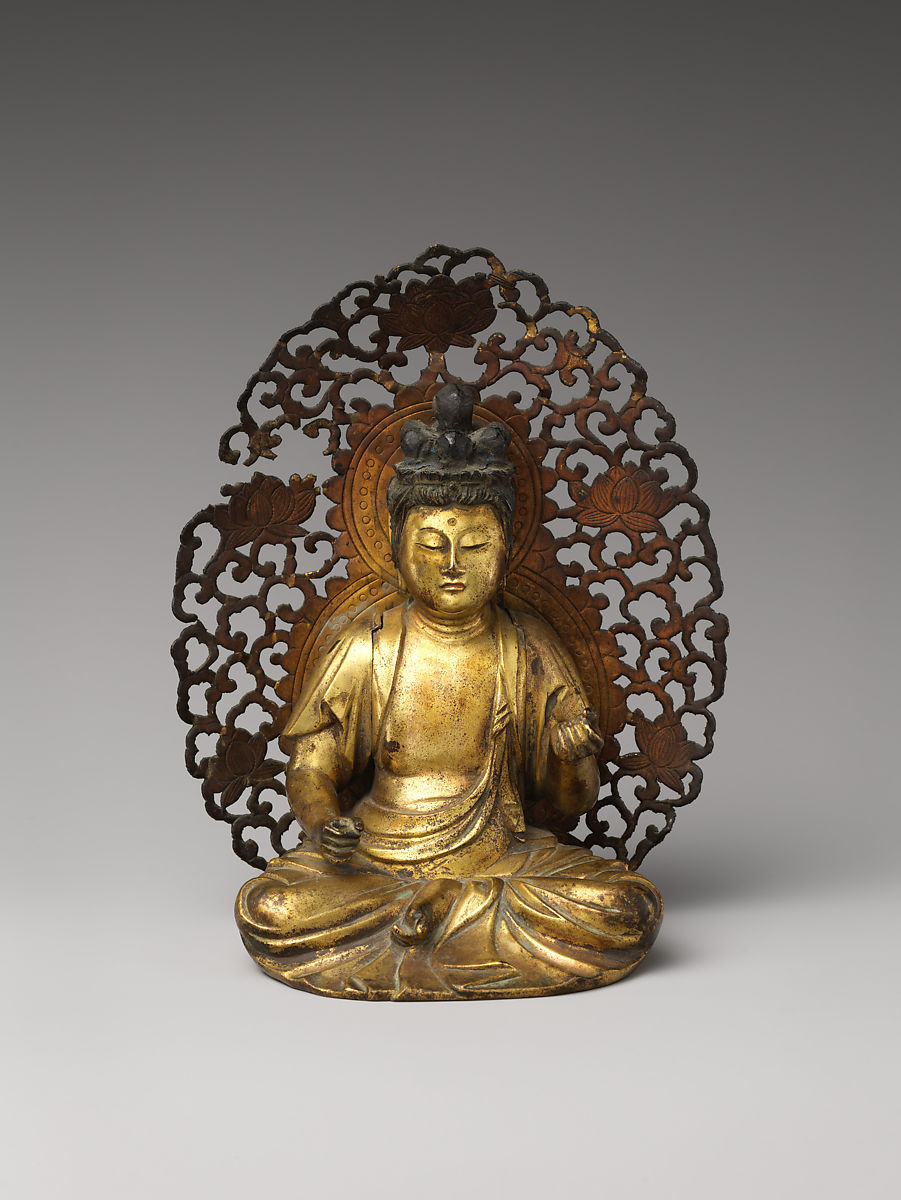23 The Consequences of the Ego and the Potential of Unselfing
Etain Brunner

Hi! My name is Etain Brunner. I was inspired to write this chapter after reading Reinhold Niebuhr’s, “Man as Sinner” in the course. This chapter from Niebuhr’s book made me consider the role our ego and sense of self have played in the shaping of our values and beliefs and how that has therefore impacted and shaped our relationship to the environment, which is something I realized we often tend to overlook. As I was exposed to more authors, theologians, and philosophers throughout the course I realized there are many perspectives on the role of the ego and I decided I wanted to take a deeper look into this, while also pondering a world where there is no influence from the ego…read more.

It has always seemed strange to me… the things we admire in men, kindness and generosity, openness, honesty, understanding, and feeling, are the concomitants of failure in our system. And those traits we detest, sharpness, greed, acquisitiveness, meanness, egotism, and self-interest, are the traits of success. And while men admire the quality of the first they love the produce of the second. – John Steinbeck
When ego is lost, limit is lost. You become infinite, kind, beautiful – Harbhajan Singh Yogi
Consumption is one of the favorite pastimes of our developed society, but it is also the source of many environmental problems. As technology has advanced, our society and economy have developed into one dependent on the mass consumption of things. Our habits of mass consumption have acted as a vehicle of destruction by increasing the amount of resources we use and waste we produce, leaving parts of our environment severely degraded. As a result, the people who have more and seem to be successful make more environmental impact, while the environmental consequences of their actions tend to be felt by the have nots. Our symbols of success that we prop up seem to be part of the problem as they have serious environmental downsides, and even though we recognize these downsides we continue to glorify consumptive habits that are destructive. But have you ever considered the roots of our need to consume?
I would argue that one aspect of our need to consume is egocentric ideas that view the consumption of things as a way to satisfy a particular identity or sense of self. This is just one observation of how the ego fuels our desire to consume, and there are many other perspectives on this as well. For example, Buddhist scholar David Loy argues that our incomplete sense of self drives our desire to consume, as we seek things outside of our selves to fill the gaps of what we believe is missing. Or in the contemporary business atmosphere, where more money and more consumptions are symbols of status, thus propping up the ego, the ego may be one of the main forces driving consumption and resulting environmental degradation. Given the role the ego may play in this environmental issue, a deeper look into the ego may present helpful insights into the origins of our current relationship to the environment and how attention to the ego can help reshape this relationship.
So, what is the ego? Many people think of the ego in connection with id, ego, and superego, as discussed in Freud’s famous psychoanalytic theory. This theory describes how the personality is made up of three components, the id, which is a part of the unconscious mind and relates to one’s needs and desires, the superego, which is the critical thinking and moralizing actor, and the ego, which acts in the conscious and unconscious mind trying to mediate the conflicting desires of the id and superego. Freud suggests a balance between the three is what makes for a healthy personality, so when one becomes more dominant than the others that is when we begin to see the negative behaviors that we often use to define an egotistical person. This is why we see the ego as being a problem for people, especially when the ego leads us to think too highly of ourselves. We talk about how academics, athletes, or CEOs are sometimes hard to manage because their egos are so big and get in the way (Cherry, 2020).

A good definition of the ego as it relates to the environment comes from the Oxford English Dictionary: a person’s sense of self-esteem or self-importance (Oxford University Press, n.d.). This definition resonates with the insights of a number of authors, including Reinhold Niebuhr, David Loy, Alan Bainbridge, Gaia Del Negro, and Iris Murdoch who each discuss their perspective on the human condition as the source of what makes us act in ego-based ways. This definition is also relevant to the ethical theory of egoistic hedonism. Despite the fact that the human condition is the source of ego-based behaviors, several authors, ethical theories, and approaches provide solutions to overcome the roots of our egotistical behavior and help reduce environmental degradation.
In contemporary American culture, one of the main approaches to dealing with the ego is through psychotherapy, which draws from the theories of Freud. Through this approach, one can unpack their own psychological dynamics by analyzing their moods, feelings, thoughts, and behaviors. By doing this they can attempt to understand how their own ego or other internal factors might be contributing to their unhappiness or stress. Through the discussion and analysis of these patterns in their life, a psychotherapist helps people become more aware of how the ego (among other factors) is acting in their lives and guides them in developing new patterns of thought and behavior that reduce the negative influences of an overblown ego. This can be helpful, but there are also further psychological constructs to consider (Mayo Clinic, 2016).
Alan Bainbridge and Gaia Del Negro are academics who do research in the field of psychology and occasionally examine its intersections with environmental issues and attitudes. In their article, “An ecology of transformative learning: A shift from the ego to the eco,” they discuss “adaptive-lag.” Adaptive-lag arises from the evolutionary based human disposition to interact with and control the external world; this is referred to as “human niche building,” and we do this to counteract the processes of natural selection. They say, “Unlike other animals, who are born adapted into a niche, the human action of niche modification results in further separation from ancestral ecological relationships,” and this increasing separation from our “ecological roots” is what they refer to as adaptive-lag. The occurrence of adaptive lag leads to an increasing disconnect between the human and nonhuman natural world. They suggest that the occurrence of adaptive-lag is also the source of human anxiety and ego defenses which cause us to act in ego-based ways since we are trying to compensate for this mismatch between the natural and human aspects of our reality. Adaptive-Lag, therefore, leads to an increased separation between humans and the natural environment over time and this separation is enhanced as we try to alleviate anxiety through ego defenses. These defenses hinder our ability for transformative learning, which further separates humans and nature and reinforces this relationship leading to limited concern for the environment (Bainbridge & Del Negro, 2020).
While there is no proposed solution to adaptive-lag, to address its’ side-effects, Bainbridge and Del Negro point to ecopsychoanalysis, which is a transdisciplinary approach that ties in the same aspects of psychoanalysis and therapy and adds a wide range of academic fields ranging from ecology to philosophy. It aims to mirror the interconnectivity, complexity, and chaos of nature itself. The goal of this analysis is to establish a sensitive awareness of the interconnectivity of the human and nonhuman worlds, as it attempts to address the anxieties and conflicts rooted in our ecological crisis. As a result, one can overcome the anxiety and ego defenses that lead us to act in ego-based ways and that inhibit transformative learning (Bainbridge & Del Negro, 2020; Dodds, 2013).
While Bainbridge & Del Negro argue that our biology is the source for our need to interact with and control the external world and that our anxiety can be relieved through a sense of connection to the nonhuman worlds, Reinhold Neibuhr looks at these dynamics from a very different perspective. Niebuhr was a Christian theologian who discussed the human condition from a Protestant perspective in his 1939 book, The Nature and Destiny of Man. According to Niebuhr, humans are finite, meaning our understanding is limited by time and place, but we are also free, meaning we recognize this limitation but do not fully know these limitations. This mismatch between the feeling of freedom but also being limited results in humans having a sense of loss of control which gives way to feelings of insecurity and anxiety. This reality of the human condition, from Niebuhr’s perspective, is the precondition for humans to act in sinful egotistical ways because we want to re-establish a sense of control (Niebuhr, 1939).

Since we have a lost sense of control our anxious egos try to fix this inner conflict through sins of pride like self-assertion. Sins of pride, which Niebuhr argues are the besetting sins of the western world, involve ignoring the grace of God and viewing ourselves as unlimited and independent. These kinds of sins can not only harm the individual but they can also harm others. One sin of pride, pride of power, involves a will to power; it is the desire to gain or exert power over others and it leads to exploitation. Those who act in pride of power think that enough power will provide them with security and safety. This gives way to beliefs that assume forms of power like technology, knowledge, or money are essential for human security and therefore solutions to the problems we face (Niebuhr, 1939).
In the context of environmental issues, sins of pride and the beliefs that they establish provide the basis for a relationship to the environment that is characterized by our power and control over it. Since we view forms of power as a way to secure ourselves, we exert power in any instance when we feel insecure. Humans feel insecure in the face of nature due to its unpredictable rhythms and in response, we attempt to gain control over it by using forms of power like technology, knowledge, or money. This can lead to the exploitation of nature if we are more concerned about exerting power and control over nature and we fail to notice the harm we are causing while doing so.
There is also pride of knowledge, which is the thought that if we know enough we can secure our own well-being. This leads to beliefs that the knowledge you have is superior or sufficient to solve problems; in this sense knowledge plays the role of God. This view of knowledge as the primary defense to the problems we face, paired with the human brain’s tendency for gestalt thinking, can translate to the overvaluing of religious, scientific, or other types of knowledge since we adopt narrow viewpoints due to our inability to focus on more than one mode of thinking at a time. This limits the tools we use for solutions as focusing on one type of knowledge obstructs the use of other types of knowledge for finding solutions. The overvaluing of scientific knowledge is particularly dominant in Europe and western society as insecurities of our own understanding lead us to depend heavily on scientific knowledge as the primary solution to our problems. When we think this way it makes it harder to solve environmental issues as there are many social, ethical, and religious dimensions of environmental problems, and scientific knowledge cannot provide complete insight into these aspects, leaving parts of knowledge out of the problem-solving process (Niebuhr, 1939).
To stop acting in sins of pride, according to Niebuhr, we must overcome our feelings of insecurity and anxiety, and come to accept the fact we are finite and free by trusting in God. By trusting in God we can overcome the self and be rebirthed in God. Acknowledging God as the center of all life enables us to accept our limitations and trust that God can secure us; this frees us from taking it upon ourselves to secure ourselves through sinful and egotistical actions like sins of pride. So, by overcoming the self and trusting in God we can separate ourselves from actions of power and exploitation and form a new value and belief system based on trusting in God. As a result, we will have a reduced tendency and desire to exploit nature since we will feel less insecure in the face of nature’s complexities. By trusting in God we can also release our material desires since our needs would be met by trusting in God rather than through the accumulation of possessions. This would significantly decrease the impact our consumption habits have on the environment as consumption would decrease. We would also have a reduced tendency to act in pride of knowledge and be less likely to overvalue scientific knowledge over other types of knowledge. This would make approaching solving environmental problems easier as we would consider the full range of the social, ethical, and religious dimensions of environmental problems along with the scientific aspects (Niebuhr, 1939).
Another perspective on these dynamics comes from David Loy, a teacher of Buddhism who discusses the human condition from a Buddhist perspective in his article “Healing Ecology.” According to Loy, a fundamental view of Buddhism is that there is no self independent of other things, which is also known as the Doctrine of Anatta, and if this is true a sense of self would only lead to suffering. He discusses how each person has a sense of self and it only exists as a psychological and social construction with no independent reality of its own. Since our sense of self is only a mental construct, it can never be complete or secure because there is nothing about the self that could be real or secured. This reality gives us a sense of lack and leads to suffering in a variety of ways, which is also known as dukkha. This feeling of lacking something and suffering from feelings of anxiety and discontent leads us to find a solution outside of ourselves in order to make ourselves feel secure. This also leads to a sense of separation from others. We do this by pursuing things like money, power, and physical possessions, which only reinforces and exacerbates the feeling of lack and separation, resulting in a positive feedback loop of suffering and death. This loop leads to beliefs that we are separate and independent of each other. It also leads to beliefs and values that view the accumulation of money, power, and possessions as solutions to our problems (Loy, 2010).

This sense of separation is true for our connection to not only other people but to nature as well and leads to a relationship to the environment that views humans and nature as independent of each other. Our separation from nature only further creates feelings of alienation, and we begin to focus on other things like consumption, progress, and growth. Loy says a key problem here is that we have advanced technology that makes it seem like we can accomplish anything, but our separation from God makes it unclear what exactly we should do with this power. As a result, we depend on our selves that already lack a grounded perspective greater than the individual, which leads to further dukkha for the individual and collective. Due to a sense of separation from nature and a missing source of values, we are more concerned with other aspects of life that contribute to the destruction of the environment and have limited concern for that destruction (Loy, 2010).
To overcome our sense of self and feelings of separation we must remember a fundamental part of the Buddhist perspective, the Doctrine of Anatta, which says that there is no self separate from the rest of the universe. To overcome our suffering, dukkah, we must come to see ourselves as part of the whole, and we can do this by gaining enlightenment through the Four Noble Truths and practicing The Noble Eightfold Path. The Four Noble truths acknowledge that our attachment to desires is the source of our suffering, once we let go of our desires, suffering will cease, and freedom from suffering can be achieved by practicing The Noble Eightfold Path. The Noble Eightfold Path is practicing the disciplines of right view, intention, speech, action, livelihood, effort, mindfulness, and concentration, and the ultimate goal is to achieve nirvana by self-awakening and being free of suffering. By doing this you overcome the self and see yourself as connected to everything else, and you recognize others’ suffering as your own suffering. This frees us from our egos and the feeling of separation and can allow us to pursue the Bodhisattva Path, where the enlightened stay to help the rest of the world achieve enlightenment. This eliminates the feeling of separation from nature that leads us to focus on consumption, progress, and growth that leads to the destruction of our environment. Through re-establishing our connection to nature and following the Bodhisattva Path we can see that nature’s suffering is our own and begin to act in ways that reflect this fact (Loy, 2010).

Echoing similar problems with our sense of self as discussed by Loy (such as a sense of separation from others and nature and selfish behavior to secure oneself) is the ethical theory of egoistic hedonism, which is one of the ugliest ways that the ego can present itself. It is a life based in self-centered pleasure-seeking; all one’s actions are means to their satisfaction. One finds pleasure in the endpoint of their actions and as soon as they get there they move on to pursue more pleasure and ultimately are never freed from this cycle of desire. Egoistic hedonists tend to only act in ways that they believe will benefit themselves. In turn, this can establish a sense that we are all independent of each other since one is so focused on themselves, failing to recognize how the improvement of the others can benefit the whole. This paves a clear path for human destruction of the environment. Since one only acts to satisfy one’s own desires, that leads us to have limited concern for the consequence of our actions, not only on others but also on the environment. It gives us self-justification for our actions even if it is at the expense of nature and feeds into other actions that degrade it as well, like overconsumption and acts driven by power and greed (Kupfer, 1999).
According to Joseph Kupfer, a philosophy professor and author, to overcome a life-based in egoistic hedonism one must self-reflect to realize the problems with their way of life. By self-reflecting, one will begin to pursue moral ends and through the process will become enriched artistically, emotionally, and morally. They will forget themselves and continue to act morally as they now find pleasure in virtuous acts. Virtuous living, as Kupfer says, is the good life and allows us to realize or perfect our human abilities, which are our natural potential. Doing this enables us to grow and flourish as human beings with happiness and good spirit, also known as eudaimonia. By acting virtuously you continue to grow in your ethical and moral understandings. If you act in virtuous ways, you will act in a way that is beneficial to the environment, and in the act of doing so, you can improve your current ethical understanding of the problem, which can help in forming solutions for environmental issues. Through virtuous living, you not only enrich your moral self but also your emotional and intellectual self, which would also allow for the inclusion of these types of knowledge in addressing environmental issues (Kupfer, 1999).
Posing another perspective of the human condition and suggesting a solution with somewhat similar outcomes as virtuous living is Iris Murdoch, a philosopher who identified the human condition as our inability to bear reality. By looking at the world from our individual lens we cannot see the world in its actuality, and therefore cannot develop a solid moral and ethical view. Unselfing, she argues, allows us to see the world rightly, which will allow us to form a moral and ethical view based on a wide range of perspectives and considerations rather than an individual view. Murdoch says that unselfing can be achieved through connections to nature or love as they allow us to see outside of ourselves; ultimately anything that draws us closer to reality can draw us away from self-centered thinking (Hauerwas, 1974).
Unselfing allows us to see the world in actuality. When we can see the world in its reality we are able to see more clearly the pollution and degradation we are inflicting on the environment and this will help shape our view of how we should respond to it. As we can better understand how we are affecting the environment, the true extent of our impacts, and can consider the full range of aspects involved in the problem, we can better approach environmental problems and form ethical and moral understandings that would prevent them (Hauerwas, 1974).

These religious, ethical, and moral perspectives provide insight into the human condition and how the ego takes it upon itself to find security from external things, which leads to suffering and a sense of separation from others and nature. This turns into exploitation, a lack of concern for our environment, and failed attempts at remedying our environmental problems. Because we also lack religious, ethical, and moral understandings like those of Niebuhr, Loy, and others, we often struggle to find solutions. Unselfing provides us a way to free ourselves of our suffering and feelings of separation and grow in our religious, ethical, and moral knowledge. In doing so, we free ourselves from the egotistical origins of our negative environmental behaviors because we are no longer insecure in the face of nature and uncertainty and we can establish a relationship with nature based on interdependence and connectivity. These dynamics apply at the individual and personal level, but as Loy argues, there is also an environmentally problematic collective egotism that likewise calls for a collective unselfing. We may egotistically question how to apply this information as we navigate through our environmental reality, and whether a collective unselfing is possible, but what seems impossible for the collective is possible through individual transformations. The path to joy and fulfillment has already been identified by these and many of the world’s religious, ethical, and moral perspectives, yet we have been drawn away from these visions in our recent history.
As Dr. Daniel Gomez-Ibanez puts it, “For millennia, people have had faith in progress, or at least believe that progress was the birthright of humankind, but it is only relatively recently that we have come to associate progress almost exclusively with increases in material prosperity. When the great teachers of the world, Christ, Buddha, Mohammad, Krishna, Confucius, Lao-Tzu, and others, point the way to joy and fulfillment, they are not talking about money and material goods, but today these have become the nearly universal talismans of goodness and wealth” (Gomez-Ibanez, 1993). Materialism has increasingly been promoted as the path to fulfillment leading to developed cultures where the ego plays a prominent role, resulting in its contribution to not only environmental problems but to many of the great afflictions of the world. Possibly in part of the ego and its drive for status in recent history, we have forgotten what we knew before. Perhaps now more than ever we should return to the visions of religions and wisdom traditions that have been paving the path to fulfillment for thousands of years.
References
Bainbridge, A. & Del Negro, G. (2020). An ecology of transformative learning: A shift from the ego to the eco. Journal of Transformative Education, 18(1), pp. 41–58, doi:10.1177/1541344619864670.
Cherry, K. (2020, November 20). Id, ego, and superego are part of a structural model of personality. Verywell Mind. https://www.verywellmind.com/the-id-ego-and-superego-2795951
Dodds, J. C. (2013, March 25). Minding the ecological body: Neuropsychoanalysis and ecopsychoanalysis. Frontiers. https://www.frontiersin.org/articles/10.3389/fpsyg.2013.00125/full
Gomez-Ibanez, Daniel. (1993). “Spiritual Dimensions of the Environmental Crisis.” In A Source Book for the Community of Religions. Edited by Joel D. Beversluis. Chicago: Council for a Parliament of the World’s Religions.
Hauerwas, S. (1974). The significance of vision: Toward an aesthetic ethic. In Vision and Virtue: Essays in Christian Ethical Reflection (1st ed., pp. 30–47). University of Notre Dame Press.
Kupfer, J. (1999). Virtue and happiness in Groundhog Day. In Visions of Virtue in Popular Film (1st ed., pp. 35–60). Routledge.
Loy, D. (2010). Healing ecology. Journal of Buddhist Ethics, 17, 254–267.
Niebuhr, R. (1939). Man as sinner. In The Nature and Destiny of Man (Vol. 1, pp. 178–207). James Nisbet & Co.
Oxford University Press (OUP). (n.d.). Ego. Lexico.Com. Retrieved December 8, 2021, from https://www.lexico.com/en/definition/ego
Psychotherapy – mayo clinic. (2016, March 17). Mayo Clinic. https://www.mayoclinic.org/tests-procedures/psychotherapy/about/pac-20384616
